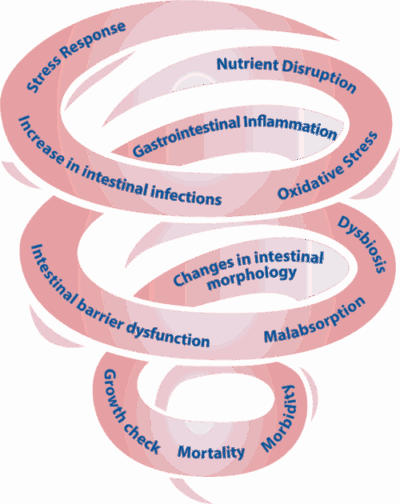Introduction
Low feed consumption during the first three days post-weaning can be considered as a natural consequence of the accumulative stressful factors that characterize piglets’ separation from their mother, resulting in perturbation of intestinal microbiota, intestinal digestion, absorption capacity, and mucosal immune function, with consequences on poor growth performance, morbidity, and mortality.
Continuity of nutrient intake as soon as piglets are weaned must be guaranteed for a successful nursery performance. The purpose of this article is to review and discuss the reasons for nutrient disruption after weaning and its consequences.
Causes of post-weaning and nutrient disruption:
- Stress: All the stress events experienced by the piglet after weaning, are thought to suppress feed consumption due to the anorectic effects of corticotropin release factor (CRF)1, which is the first hormone released in response to acute stress, initiating the body’s stress response system.
- Failure to adapt to a new environment: Beside weaning stress, a reduction in feed intake is associated to the failure or delay to adapt from liquid milk to a solid dry feed that is less digestible and palatable. The transition is usually complicated by the learning process to a different environment with separate feed and water sources as compared to the single milk-based diet (sow’s milk), which requires them to adapt and to familiarize themselves with the difference between hunger and thirst satiety2. Once feed is discovered, normal eating and drinking patterns are established and pigs become more comfortable in their new environment. It is for this reason that water intake tends to be the greatest nutrient consumed in the first 24 hours and remains elevated for the first several days post-weaning (Brooks et al., 1984), suggesting that dietary supplements may be more beneficial when administered through the water rather than feed (Dybkjær et al., 2006).
- Immune system activation: Release of inflammatory cytokines after immune system activation are known to further suppress appetite, reducing food intake and nutrient absorption (Escobar et al, 2004).
